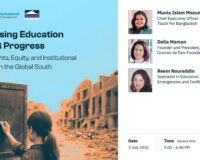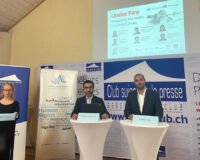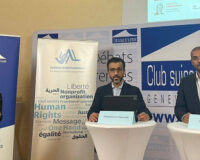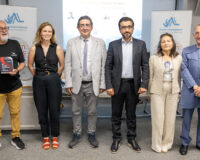Mohamed Al Hammadi: Mohamed Al Hammadi, an esteemed Emirati writer and journalist, and the President of Jusoor, provided invaluable insights into the landscape of false information as a weapon, elucidating its profound impact on conflicts. Drawing from his extensive experience as the editor-in-chief of Al-Ittihad newspaper and his current role as editor-in-chief of Al-Roeya newspaper, along with being the founder and inaugural editor-in-chief of the National Geographic Arabic magazine, Mohamed delved into three critical subtopics.
Mohamed presented compelling case studies illustrating the tangible repercussions of false information on various conflicts. Through meticulous analysis, he highlighted how misinformation can exacerbate tensions and escalate hostilities, underscoring the need for heightened awareness and proactive measures to counter its spread. Delving deeper, Mohamed elucidated the intricate role of propaganda and orchestrated disinformation campaigns in shaping public opinion and influencing geopolitical dynamics. He emphasized the sophistication of modern propaganda techniques and the imperative of discerning genuine sources amidst a deluge of misinformation. In his exploration of identifying sources and motivations behind false information, Mohamed provided critical insights into the multifaceted nature of information warfare. By examining the underlying motives driving the dissemination of false information, he underscored the necessity of robust mechanisms for source verification and attribution. Mohamed’s expertise as the President of the UAE Journalists Association and his profound understanding of media dynamics make his contributions invaluable in navigating the complex terrain of false information warfare, offering actionable strategies for mitigating its adverse effects and fostering informed discourse.
Valéria Emília de Aquino: Valéria Emília de Aquino, a distinguished human rights lawyer and PhD candidate at the Federal University of Goiás (Brazil) specializing in human rights and climate change, delivered a comprehensive analysis on the role of media throughout history, particularly during significant conflicts like WWII, the Cold War, and the Vietnam War. Drawing from her extensive experience in international organizations and courts, Valéria emphasized the influence of media discourse on societal perceptions, examining themes such as fake news, migrant narratives, and the vulnerability of marginalized groups. She underscored the need for nuanced media coverage, highlighting its impact on humanitarian aid allocation and decision-making processes. Valéria also outlined strategies for combatting misinformation, advocating for government initiatives, civil society engagement, and corporate responsibility. As a researcher at ‘Direito Internacional sem Fronteiras’ and Global Crossings, and a scholar at CAPES and FAPEG, her insights carry significant weight in addressing the complex intersection of media, human rights, and conflict resolution.
Viola Krebs: Viola Krebs, Ph.D., an esteemed lecturer at the University of Geneva and an expert in digital technologies and artificial intelligence (AI), provided profound insights into the intersection of media, technology, and conflict, elucidating strategies for building resilience in the face of information warfare. Leveraging her extensive experience as a Strategic Advisor at La Forge Numérique of the University of Geneva Center for Informatics (CUI) and her active participation in European AI-related working groups and projects, Viola delved into three pivotal subtopics. Viola underscored the importance of media literacy and educational initiatives in equipping individuals with the critical thinking skills necessary to navigate the digital landscape effectively. Drawing from her expertise in designing and managing international technology and communication projects across continents, she emphasized the role of education in fostering resilience against misinformation and propaganda. In her exploration of leveraging technology for information verification, Viola highlighted the transformative potential of AI and digital technologies in combatting misinformation. As a seasoned educator and researcher in digital technology and its societal applications, she offered insights into innovative approaches for enhancing information authenticity and reliability through technological advancements. Viola emphasized the imperative of international cooperation in countering information warfare, stressing the need for collaborative efforts across borders. Drawing from her extensive experience in multicultural environments and her involvement in various United Nations summits and processes, she advocated for collective action and knowledge-sharing to address the global challenge of disinformation and digital manipulation. Viola Krebs’s expertise as a lecturer and researcher, combined with her vast experience in both the public and private sectors, positions her as a leading voice in navigating the complex nexus of media, technology, and conflict. Her insights offer actionable strategies for fostering resilience and safeguarding societal integrity in an increasingly digitized world.
The panel discussion held on March 8, 2024, at the Graduate Institute of Geneva, brought together experts from diverse backgrounds to explore the intricate dynamics of media, technology, and conflict. Mohamed Al Hammadi, Valéria Emília de Aquino, and Viola Krebs provided invaluable insights into the multifaceted challenges posed by false information, propaganda, and digital manipulation in contemporary conflicts. Their collective expertise highlighted the urgent need for proactive measures to combat misinformation, promote media literacy, and foster international cooperation. As we navigate an increasingly digitized world, their contributions serve as a clarion call for collaborative efforts across sectors to build resilience, safeguard societal integrity, and uphold the principles of truth and informed discourse.























